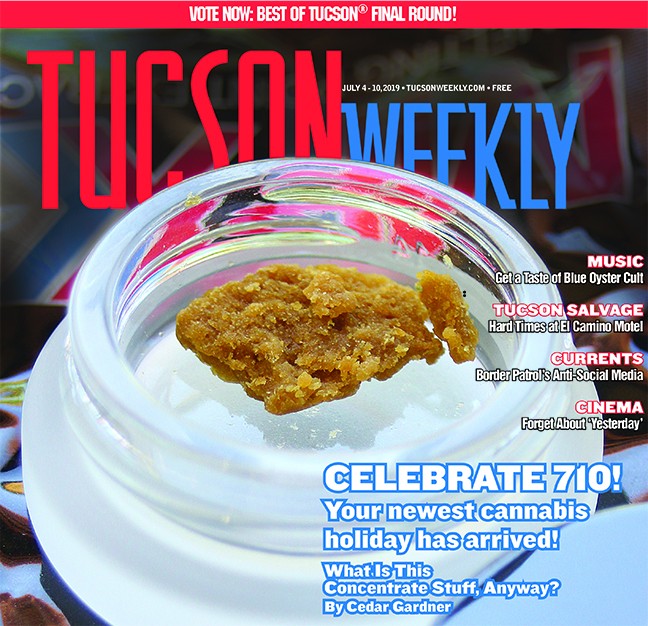Shatter, wax, crumble, hash, distillate, oh my! Possessing extracts is no longer a legal gray area for Arizona medical marijuana cardholders, thanks to a unanimous Arizona Supreme Court ruling in late May.
It all started with the case of Rodney Jones, a qualified medical marijuana patient who served two-and-a-half years in prison for the possession of 1.4 grams of hashish after he was prosecuted by Yavapai County Attorney Sheila Polk.
The ruling helps fight stigmas about marijuana use by clearly allowing extracts, although they weren't explicitly disallowed previously. It ensures that qualified patients will continue to have access to the safest and most effective medicine out there—and that they won't serve time for using it, either.
"This ruling brings clarity to the law," said Tim Sultan, the executive director of the Arizona Dispensaries Association, which helped establish the legal fund that took Rodney Jones' case to the Supreme Court. "This is a win for patients and all voters in Arizona."
For industry professionals and cannabis users, the eventual clarification of the Arizona Medical Marijuana Act seemed like an obvious conclusion. But a man spent two-and-a-half years in prison—over a flawed, stigmatized interpretation of the existing legislation.
"We are pleased with the court's decision because it will ensure that patients can continue to get the treatments they need, using the administration method that works best for their individual health situations, as the voters originally intended when passing the Arizona Medical Marijuana Act," said Eric Fraser, an attorney for the Arizona Dispensaries Association.
Concentrates are the next logical step in the constantly developing science of cannabis-based medical treatment. Now that the stigma placed around concentrates—a stigma that landed Rodney Jones in prison—is slowly being quelled and safety/testing standards are being implemented by the state, dispensaries are diving full-force into the science and innovation of marijuana extracts.
Luke Belson, an industry consultant for Tucson's Downtown Dispensary says this is not necessarily a new technique in science, but a widely used process that is being applied to this industry.
"Crude oil is created with fractional distillation," Benson said. "The same process they use in the oil industry—that's the same process were using here, but on a smaller scale."
Smoking marijuana is, of course, less dangerous than smoking cigarettes. That being said, there are certain dangers to smoking anything, especially for people who are being treated for a chronic illness, which is a reason concentrates and extracts are so useful.
Vape pens, which are made with concentrated hash oil or distillate, are a top choice for patients because of their convenience and effectiveness. Here, patients can receive the same helpful benefits obtained from smoking flower, but with just one hit—and without the skunky smell.
Cannabis extract, which mixes easily with cooking oils, is often also used when crafting baked edibles, candies, sodas and the many other products on dispensary shelves.
Including licensed caregivers and dispensary agents, there are now more than 200,000 people in Arizona alone who carry medical marijuana cards.
As researchers learn more about cannabis, they are learning that specific types of cannabinoids and terpenes can provide different types of relief. Medical marijuana products can be customized through extraction to treat a patient's specific symptoms. Cannabinoids like CBD can be specifically isolated, for example, to fit a patient's needs, such as the opposite scenario: someone who needs a medication with no psychoactive effects.
Claire Levenberg, research and development manager for Tucson's Downtown Dispensary is a proponent for the use of delta 8, an isomer of delta 9 (in THC) that is less psychoactive.
"Delta 8 has been shown, specifically with children, to be really beneficial for seizures without having the psychoactive effects," Levenberg said. "So you get all the benefits of the THC without the psychotropic effect."
Various solvents can be used to create extracts or to distill different compounds in a plant, from volatile compounds such as butane to cold processes such as ethanol distillation, which is the choice extraction technique for isolating compounds for specific purposes and for specific people.
"Because we are each different genetically... certain cannabinoids affect me differently than they affect the person next to me," Levenberg said. "So the idea of treating the patient instead of the symptom is interesting, because it is going to be different from person to person."
Cannabinoids and terpenes work together in what's been dubbed the "entourage effect." Terpenes, which are what give a plant its aroma, interact with the various cannabinoids in marijuana to cause different medicinal effects than would exist had terpenes not been present.
"Terpenes have been shown as aromatic compounds to help the cell receptors, the endocannabinoid system that your cells all have, and to kind of amplify that so that the take-up of cannabinoids is increased," Levenberg said.
Belson added: "The good thing about terpenes is depending on what terpene profile you're working with, that dictates the effect. THC has a baseline effect—a mild effect—but then when you start pairing it with other terpenes the effect goes different directions based on the terpene profile."
In an industry that is bogged down by stigma and a flowery cultural past, it is more important than ever to take a serious look at what benefits some of these products really have, and their ability to really change people's lives for the better.
Extracts have huge potential to take medical cannabis out of the mistrusted realm of naturopathic medicine and into the area of being used for legitimate, specific, even non-psychoactive purposes. ■


